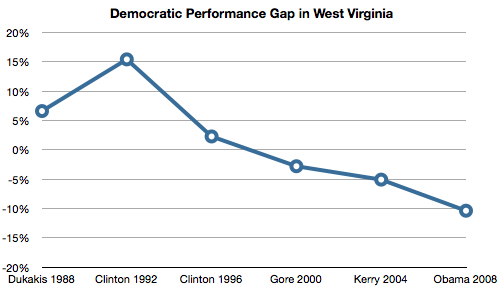Matthew Yglesias's Blog, page 2441
January 24, 2011
Growth and the Middle Class
Kevin Drum observes:
As for the broader electorate, they don't care much about broad economic growth either. They care about their own paychecks. This means that if Democrats want to win them over, they need to support policies that support economic growth and channel that growth largely toward the working and middle classes. Those are separate challenges, but without them both an agenda dedicated to economic growth won't really do us much good.
I'm not really sure how separate they are. I think the specific fate of the very poor can become pretty unmoored from overall economic conditions, but certainly as a historical matter middle class incomes have risen the most at the same times America's has had the most rapid economic growth—the 30 years after World War II and the late 1990s. You can construct some models in which this isn't the case, but in practice the basic mechanisms for faster economic growth lead to rising middle class incomes, though not necessarily rising incomes for each individual middle class household.


Paul Ryan's Crank Monetary Economics

(cc photo by shrff)
Via Noam Scheiber, Noah Kristula-Green explores Paul Ryan's notion that we should replace our current floating currency with one whose value is based on a basket of commodities.
The best way to think about this idea and the severe problems with it are to think of prisoners using cigarettes as a medium of exchange. A medium of exchange is a valuable thing to have, and cigarettes are an appealing option. They're light, small, largely non-perishable and have an "intrinsic" value to addicts. But once you have a whole cigarette-based economy, your problem is that this economy becomes subject to external shocks based on the supply and demand for cigarettes. If a bunch of heavy smokers suddenly get sent to your prison, demand for cigarettes skyrockets and the cigarette-denominated price of everything drops severely reducing real output as everyone enters a downward spiral of cigarette hoarding. Alternatively, the introduction of Nicorette into the prison might create declining demand for cigarettes and inflation.
In a fiat currency regime, if demand for dollars goes up you print more dollars. If inflation becomes problematic, you reduce the quantity of dollars. In a commodity-based regime, this doesn't work. If China grows 8 percent per year and that drives up demand for the commodities to which your currency is pegged, then you get deflation. If entrepreneurs discover a much cheaper way to run mines, then you get inflation. Now if you happen to be operating in a low-trust environment like a prison these downsides may be small relative to the logistical hurdles involved in setting up a central bank. But if you already have a functioning central bank and a widely accepted currency, it'd be kind of crazy to give it up and revert to prison conditions.


The Death of Democratic West Virginia
I was too doped-up Saturday night to go out, so I got to spend some quality time looking at historical presidential election outcomes, and one really striking trend to emerge is the sharp decline in the Democratic Party Presidential vote in West Virginia. Since the underlying political conditions shift from year to year, this is best seen in terms of the difference in the Democratic vote in West Virginia from the overall level of support for the Democratic candidate.
To wit:

Which is just to say that in the very recent past, West Virginia was a considerably more-Democratic-than-average state. We're not talking about the distant past or Harry Truman Democrats or whatever. Even post-civil rights, post-Roe, post-Reagan, post-"wedge issues," post everything Michael Dukakis Democrats were more popular in West Virginia than they were in the country at large. By contrast, Al Gore, John Kerry, and Barack Obama have all been less popular in WV than they are nationwide. And increasingly so.
And while I'm sure on some level this is a complex and multi-faceted phenomenon, on another level it's not. In recent electoral cycles the Republican Party has been willing to pretend that there are no important negative externalities associated with mining and burning coal, whereas on a national level the Democratic Party has been inclined to acknowledge reality. And in West Virginia coal is seen as a key pillar of the economy.
No profound insights there. But I think more attention needs to be paid to this sort of thing. When liberals write about "politically influential mass membership organization[s] dedicated to the economic concerns of the middle class" they mean as opposed to the interests of richer people. But in many cases people middle class people have a sector vs sector view of the economy rather than a class vs class view. And I think that in a mature, prosperous country in which people have advanced specialized skills this is more and more the way people see the world.


Douthat Proposes "Modify Modestly" As an Alternative to "Repeal and Replace"

Ross Douthat urges that conservatives try to take a more constructive tack on modifying the Affordable Care Act than the current mantra of repeal it or defund it:
To address the first problem, Republicans should work to deregulate the new health care exchanges, so that high-deductible, catastrophic coverage can be purchased as easily as comprehensive plans. To address the second, they should propose capping the subsidies for the uninsured, so that they don't dramatically exceed the value of the existing tax subsidy for employer-provided insurance.
The mandate is a harder puzzle, since it works in tandem with the requirement — popular enough to have many Republican supporters — that insurers cease denying coverage to customers with pre-existing conditions. If you repealed the mandate without repealing that requirement, people could simply wait until they were sick to buy insurance, driving everyone's prices up.
But Republicans could propose dealing with the same problem in a less coercive way. [...]
I'd certainly hope to see this as the future of the health care debate. The Douthat approach starts from the premise that the goal of universal subsidized regulated private health insurance is legitimate. And it agrees that to get there you need what the ACA offers, namely a solution to the problem of adverse selection, a regulatory definition of "health insurance," and taxpayer financed subsidies to make it affordable to everyone. If you assume a world in which this ACA tripod is generally accepted, political disagreement then takes the form of one side wants to get ambitious with the definition of "insurance" even though this means more expensive subsidies and another side wants to restrict the cost of subsidies even though this means accepting a more modest definition of insurance.
The upshot of that wouldn't be my health care utopia, or even a policy I'm totally thrilled with, but I think it would be a decent outcome and it would be one in which universal coverage and the basic framework of the Affordable Care Act becomes entrenched. And this, or something like it, is the ultimate outcome of health care policy debates in most countries. Obviously left-wing and right-wing parties disagree about tax rates and spending levels, but they generally work inside a common framework.


The Exquisite Sadness of the Businessman

As well as illustrating why I don't particularly like the term "neoliberal," which tends to just serve as a vague term of abuse, I think Mike Konczal's post on narcissistic business elites is absolutely brilliant:
It seems that there is an increasing sense among certain types of neoliberal business elite that Obama hasn't been favorable enough to the business community, and that he needs to reconcile this fast in order to fix the economy. Look at Peter Baker's article on Obama's job's programs, which doesn't mention housing but does stop by the Chamber of Commerce to note: "But Obama's periodic forays into populism made it personal. He couldn't seem to decide whether he was going to take Wall Street to task for its irresponsible behavior or cajole it into freeing up money to get the economy moving. One day he derided "fat-cat bankers" who caused the recession; another day, he soothed them by saying that he and the American people "don't begrudge" multimillion-dollar bonuses."
Think about that. Why is Obama once calling members of the financial sector "fat-cat bankers" – while they were rolling the taxpayer, paying huge bonuses out of TARP and the Federal Reserve – important for an article about jobs? Is the idea that business leaders feel sad and offended important for why demand is down and unemployment is high? The government can act, through monetary and fiscal policy, to get jobs going again, but that leaves business elite not in charge of the economy.
I wrote about this for a recent TAP online column, and I agree with Konczal entirely. The notion that economic growth depends crucially on the subjective feelings of the business executive class is one of the most pernicious ideas to take hold over the past 12 months. One should distinguish this hypothesis from the accurate point that rational expectations matter in the economy. Expectations do matter. But this is often confused with the idea that if the waiters at Davos are rude this year the economy will go into a recession, but if Obama gives a CEO a really sensual back rub growth will return.
The fact of the matter is that businessmen like conservative politicians. If you ask them "how do you feel about the incumbent politicians these days" they say "I feel great" if and only if the incumbent politicians are conservatives. Economic growth was better in the 1990s than in the 2000s, but businessmen liked George W Bush better than Bill Clinton. Growth was better under FDR than under Eisenhower, but businessmen liked Ike. And that's fine, businessmen are free to like or dislike whomever they want. But their subjective view of politicians doesn't cause or hamper economic growth.
That's all just repeating what Konczal said. But to add another thought, I really do think progressives need to try harder to claim the mantle of growth for ourselves. Conservatives like to talk about the importance of economic growth, but they're not only bad at delivering it in practice, they're remarkably hostile to the idea of boosting growth. They favor certain labor- or ecology-crushing measures that are said to increase the economy's growth potential, but they're unremittingly opposed to the idea that the government should, in fact, try to run the economy at its potential level of output. The esoteric idea, I think, is that actual prosperity would make people sort of soft and flabby while recession makes austerity "necessary" as a matter of budgetary math.


January 23, 2011
Sex Offender Blockbusting
Steve Randy Waldmann conveys an interesting money-making possibility from Scott Wentland:
Still, for all the finance and economics I encountered at the conference, Wentland is the only person whose work suggested a way to actually turn a profit. Wentland presented a paper at the conference. I missed the presentation, but read the paper after the fact. It is empirical work very nicely done, and it tweaked the antennae of my inner, amoral arbitrageur. I now think of registered sex offenders as roving Groupons for home flippers. Wentland and his coauthors provide strong evidence that you could make a lot of money persuading an ex-cellmate to move near a nice, four bedroom home in rural Virginia, and then to move away after you've bought the home.
Maybe when the real estate market picks up again people will start doing this. Indeed, I sort of hope they do since my impression is that these sex offender databases should probably be done away with and screwing with people's real estate value seems like the most likely way to make that happen.


Acronym Mania
I wholeheartedly agree with Sarah Arnquist here:
Littering a paper with acronyms serves only to turn it into alphabet soup and guarantee readers will remember nothing substantive and only how hard that was to read. A development agency report I read recently used 23 acronyms in ONE paragraph! I know you've heard this before but it's worth repeating. My editors used to make me delete an acronym at least once a week. Do you have an editor monitoring your acronym littering?
I find this at its most egregious in military circles. This may derive from the fact that in the relatively recent past minimizing the number of characters in a communication was, in fact, an important element of telegraph-era warfare. But I see that otherwise very competent writers tend to not only accept, but embrace and positively revel in the military's acronym-happy culture. This helps marks them as "insiders" to America's most socially validated institution. But it's difficult to believe that all this stuff, whether in defense or development or any other field, really does much to improve communications or is even intended to do so.


Union Power
Kevin Drum says:
If, right now, you were to offer corporations and the rich a choice between (a) passage of EFCA or (b) a return to Clinton-era tax rates on high incomes, they wouldn't even blink. If you put a gun to their head and they had to choose between one or the other, they'd pay the higher taxes without a peep. That's because, on the level of raw power, they know how the world works.
That's definitely true. But in large part that's because if you allowed more unionization in exchange for some tax cuts, the stronger unions would just turn around in the future and create a political dynamic that's friendly to tax hikes. Which if you ask me would be great. But I think labor-friendly writers sometimes don't do the best possible job of distinguishing between unions qua social and political institutions and collective bargaining as a labor market institution. Something like EFCA is the only way to revive collective bargaining as a major force in private sector labor markets. But I don't think it's correct to see EFCA –> union density as the only conceivable form of politically influential mass membership organization. Unfortunately for progressives the best example I've got of a non-union politically influential mass membership organization is the NRA, but that just goes to show that you can, in fact, get a lot done if you've actually got a bunch of people who really care deeply about something.


The Mystery of Tight German Money
To agree with John Quiggin, the mystery to my mind of current European Central Bank policy is why are they insisting on money that's too tight for German interests? It's easy to see why the ECB isn't implementing policy that as loose as would be optimal for Spain or Ireland. And it's true that on some level there's simply no way to set ECB policy in a way that works for everyone. But what they're doing is too tight even for Germany where, for all the bragging, the actual output recovery has been kind of unimpressive.
After all, if the German industrial dynamo was really firing as robustly as sometimes people say you'd expect to see factories expanding operations and hiring workers away from the German service sector. Then unemployment Spaniards and Irishmen would migrate to work German service jobs. It's true that Europe's labor markets are imperfectly integrated, but they're not that unintegrated either. If there was a true boom in Germany, people would make there way over there.


Pain Relief
Physical pain is a fairly common occurrence in life, so I suppose everyone walks around figuring it's a sensation they're familiar with. But something I learned over this past week is that there was a whole new level of pain far beyond anything I'd previously experienced. In my case, it was caused by a small cyst growing beneath one of my wisdom teeth that was pressing on a nerve in my jaw. And, fortunately, it was easy for an oral surgeon to remove. But it hurt a lot while it lasted, and the experience was terrible.
It made me think back to complaints I'd read and briefly acknowledged over the years about how the "war on drugs" has interfered with medical efforts to treat pain. As Mark Kleiman put it:
Physicians and their regulators are naturally concerned about the risk of iatrogenic (treatment-induced) drug dependency. Consequently, they have tended to be sparing in their use of opiate and opioid pain relievers, even when the pain involved is extreme and the patient's short life expectancy, as in the case of terminal cancer patients, makes addiction a largely notional problem. Better professional education has made more recent cohorts of physicians less afraid of over-prescribing painkillers than their older colleagues, but the upsurge of prescription-analgesic abuse (especially of hydrocodone [Vicodin] and oxycodone [Percodan, Oxycontin]) has generated a backlash. [...]
Current policies are scaring physicians away from treating pain aggressively. Many doctors and medical groups now simply refuse to write prescriptions for any substance in Schedule II, the most tightly regulated group of prescription drugs, including the most potent opiate and opioid pain-relievers and the potent amphetamine stimulants. The opiate-and-stimulant combination the textbooks recommend for treating chronic pain is almost never given in practice for fear (a fear well in excess of the actual risk) of disciplinary action and criminal investigation for a physician prescribing "uppers and downers" together. It's time to loosen up.
This is terrible. One of the most interesting findings from the happiness research literature is that human beings are remarkably good at adapting to all kinds of misfortunes. Chronic pain, however, is an exception. People either get effective treatment for their pain, or else they're miserable. Adaptation is fairly minimum. The upshot is that from a real human welfare perspective, we ought to put a lot of weight on making sure that people with chronic pain get the best treatment possible. Minimizing addiction is a fine public policy goal, but the priority should be on making sure that people with legitimate needs can get medicine.


Matthew Yglesias's Blog
- Matthew Yglesias's profile
- 72 followers



